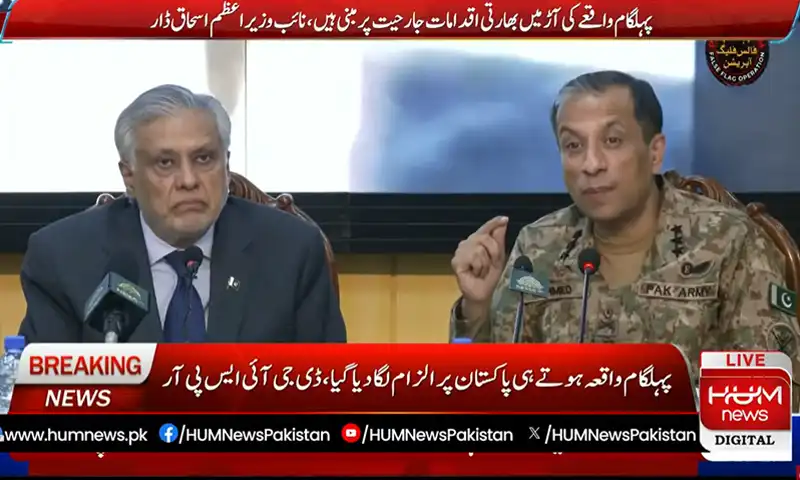- Web
- Today
Pakistan warns of strong retaliation to Indian aggression
-

- Web Desk
- Apr 30, 2025

ISLAMABAD: Deputy Prime Minister (DPM) and Foreign Minister Ishaq Dar on Wednesday warned that any attempt by India to block Pakistan’s water ensured under the Indus Waters Treaty would be considered an act of war, calling it a grave violation of international law.
Addressing a joint press conference with Director General Inter-Services Public Relations (DG ISPR) Lt Gen Ahmed Sharif Chaudhry, Dar said India has no legal right to stop Pakistan’s water under the World Bank-brokered Indus Waters Treaty.
“Water is Pakistan’s lifeline,” he stressed. “India’s move to unilaterally suspend or delay provisions of the treaty is not only provocative but a breach of international agreements.”
He said that India is deliberately escalating tensions in the region following the Pahalgam incident and warned that New Delhi’s actions pose serious threats to regional peace and stability.
He added the entire region is now at risk due to India’s “irresponsible behaviour” after the Pahalgam attack.
The DPM said India’s “illegal and provocative actions” have made the situation more complicated and dangerous.
“Under the guise of the Pahalgam incident, India has taken aggressive measures that are unacceptable,” he said, adding that New Delhi’s inflammatory statements and conduct threaten peace across South Asia.
Dar reiterated that Pakistan has always been a victim of terrorism and has consistently condemned all forms of it. “Pakistan has suffered the most in the global war against terror,” he said. “The killing of innocent civilians can never be justified under any circumstances.”
Dar criticised the Modi government for its consistent human rights violations in occupied Kashmir. “India is using propaganda and baseless allegations against Pakistan to divert attention from its internal failures,” he said, adding that New Delhi is weaponising narratives for political mileage.
He reaffirmed Pakistan’s offer to conduct a transparent and impartial investigation into the Pahalgam attack. “We have nothing to hide. Pakistan has no connection to the incident.”
Warning India against adventurism, Dar said: “We will not initiate any conflict, but if war is imposed on us, the response will be decisive and strong.” He reiterated that the Pakistani armed forces are fully prepared to defend the country.
The minister said Pakistan is actively engaging with the global community to prevent escalation and added that the UN Security Council had also condemned the Pahalgam incident. “No one understands the pain of terrorism victims more than Pakistan,” he said, noting that India itself is involved in terrorist activities across Pakistan and other countries.
He urged the international community to take notice of India’s actions and play its role in preventing further escalation in the region.
DG ISPR Highlights Inconsistencies in Indian Narrative
ISPR Director-General Major-Gen Ahmed Sharif Chaudhry talked about India’s false flag operation in Pahalgam, highlighting technical inconsistencies in the Indian narrative.
He questioned how, in the aftermath of the Pahalgam incident, a journey that typically takes 30 minutes was completed in just 10 minutes, an FIR was registered at a police station, and the police returned to the crime scene — all within that time frame.
“A review of the FIR reveals how India linked the incident and its alleged perpetrators to Pakistan within 10 minutes, indicating premeditation.”
He said that an attempt was made to stoke religious discord by implying that only Hindus were targeted, not Muslims.
According to the DG ISPR, propaganda against Pakistan began at 3:05pm on April 24 from accounts linked to Indian intelligence, and by 3:30pm, Indian media had echoed the same narrative. By 4:00pm, he said, reports were circulating that the attackers were Muslims. “We believe terrorism has no religion or ethnicity,” he said.
Lt-Gen Chaudhry also shared video clips of statements by Kashmiris, Indian citizens, politicians, and journalists raising questions about the Modi government and Indian military.
He said this was not the first time India had used terrorism for political gains, recalling how the Pulwama attack was similarly exploited to revoke Kashmir’s special status.
The army spokesperson said that the same social media accounts that became active after the Pahalgam incident were also active after the Jaffar Express attack. He said India would be held accountable for its accusations and actions.
He also said that Indian authorities plan to kill Pakistani prisoners in staged encounters and label them as terrorists. The DG ISPR showed the detention dates of several Pakistani prisoners and aired interviews of families of those who were allegedly martyred in fake encounters.
He said that on April 24, Indian forces killed 54-year-old Farooq in a staged encounter. A video of Indian troops desecrating the body of a Kashmiri civilian killed in a fake encounter in Kupwara on April 23 was also shown.
The DG ISPR also aired a video of confessional statements by detained militants who admitted receiving support from India’s intelligence agencies to destabilise Pakistan. He said Indian media aired AI-generated visuals and videos created by the terrorists involved in the Jaffer Express attack.
According to Lt-Gen Chaudhry, investigations had confirmed that the extremist group “Fitna al-Khawarij” also has Indian backing.
He said that 3,896 civilians were killed in 3,700 terror incidents since January.
He said Pakistan had witnessed 3,700 terrorist incidents since January this year, in which 3,896 civilians and 1,314 security personnel were martyred, while 2,582 others were injured.
He said that security forces carried out 77,816 operations, during which 1,666 terrorists — including 83 high-value targets — were eliminated.
He said that following the Pahalgam incident, Indian forces in the occupied Kashmir bulldozed dozens of homes labelled “suspicious” and arrested thousands of Kashmiris on terrorism charges. Hundreds are reportedly being harassed daily, he added.




